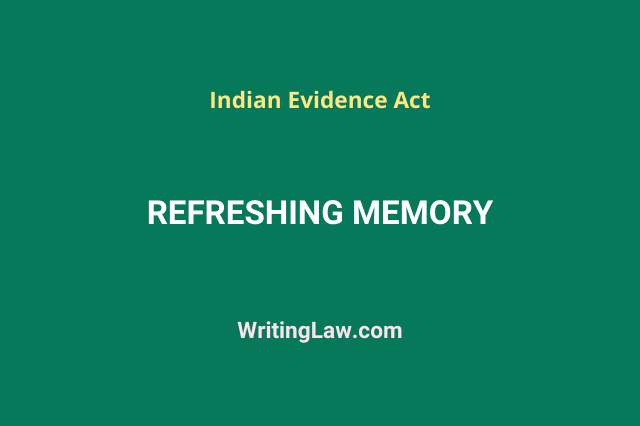
As you already know that the legal system works on evidence. And in order to provide justice, these pieces of evidence play a very crucial role. One such evidence is by presenting witnesses in the court of law.
A witness is a human being. Several occasions occur in an individual’s life, and it’s impossible for a normal person to remember all the exact facts. It’s a basic human tendency that a normal human cannot keep so much information in his small brain at all points of time.
Therefore, sometimes people maintain a diary or any other form of writing to keep such occasions always fresh in their memory for a long term.
In Indian law, for the purpose of providing proper justice, a witness is allowed to refresh his memory. That is, the witness is allowed to recollect past facts.
Sections 159 to 161 of chapter 10 of the Indian Evidence Act, 1872, deals with the recollection of the past.
Let us take a look.
Refreshing Memory Under Section 159 of the Evidence Act
Section 159 of the Indian Evidence Act deals with the concept of refreshing memory. It says that while under examination, specifically concerning the question put to the witness, he may refer to any of the written document which comes under either of the three categories:
1. A witness may refer to any document which is written by himself:
(a) at the time of the transaction concerning which is questioned to him. or
(b) to the writing which he made soon after afterword, that the court finds it to be likely that the transaction was at the time when he wrote such document is fresh in his memory.
2. A witness may refer to any document which is written by any other person but must be read by the witness within the time so that when he reads it, he recalls the same.
3. An expert witness may refresh his memory by giving reference to the professional treatises.
Provided: Wherever a witness refreshes his memory by referring to any written document, then he must, with the prior permission of the court, also refer to a copy of such document, i.e. secondary evidence. Further, provided that such copy of the document can be produced only when the court is satisfied that there is sufficient and reasonable reason for the non-production of the original document.
Bondhu vs Emperor (1949): In this case, the court held that it should be borne in mind that for refreshing memory, the document or writing may not be admissible, but facts tried to be proved must be admissible under section 159.
Must Read: What Is Evidence and Ten Types of Evidence
Section 160 of the Evidence Act – Testimony to Facts Stated in Document Mentioned in Section 159
It says that the witness’s memory is not refreshed, and although he has no specific recollections, he guarantees that the document contains a true record of facts. Here the document itself is presented, and it is evidence.
Under section 160 of the Indian Evidence Act, it is not at all necessary that when a witness, while looking at a written document, should have an independent or specific recollection of the matters stated because this might happen that exact facts might have slipped from his memory. Still, if he recognises the writing or signature and feels sure that the content of the document was correctly recorded, he may testify to the facts that are referred to in the document.
This can be understood with the help of an example: A librarian may testify to facts that are recorded by him in books regularly kept in the ordinary course of business. Now it may happen that he might have forgotten the particular transactions he entered, but he knows that the books were correctly kept.
Section 161 of the Evidence Act
Now let us see the right of adverse party as to writing used to refresh memory, i.e. section 161 of the Indian Evidence Act.
At one end, it is a good favour for the party or the witness that he was allowed to refresh his memory through any document. But on the other hand, it would amount to injustice towards the opposite party to examine it.
Section 161 of the Indian Evidence Act gives a right to the adverse party. It says if the adverse party requires such document referred under sections 159 and 160 of the Act to be produced and shown, then he has a right and must be produced. Also, he may cross-examine the witness for the same.
Case Laws for Refreshing Memory
Ram Chandra vs Emperor (1930): In this case, the court held that a witness could refresh his memory, at the time of his examination, by looking into the newspaper.
Indra Mohan Brahma vs State of Assam (1982): In this case, the court held that a witness could refresh his memories regarding the facts stated by him if the writing was made either at the time of the transaction or shortly after the transaction.
Roop Chand vs Mahabir Parshad (1956): In this case, the court held that the words “in visible form” exclude the possibility of a tape-recording being a “writing”. Thus tape-recording cannot be used for refreshing memory by a witness.
You may also like:
1. What Is Hearsay Evidence
2. What Is Primary and Secondary Evidence
3. Important Sections of Indian Evidence Act
- What Is Anticipatory Breach of Contract Under Contract Act? - 13th July 2024
- Who May File Written Statement (With Its Time Limit and Rules) - 31st May 2024
- Who Is a Legal Representative? - 30th May 2024







